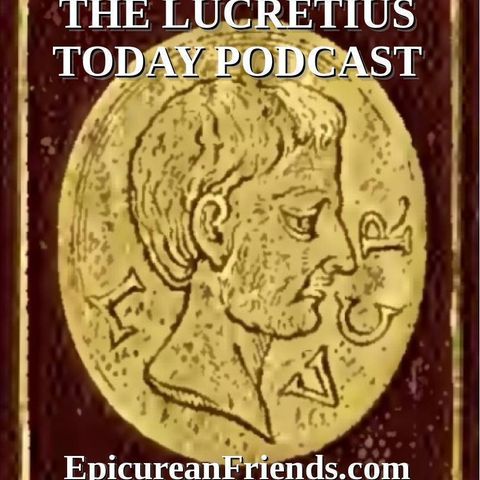Episode 238 - Cicero's OTNOTG - 13 - Velleius Erupts Against Stoic Fate and Supernatural God-Making

Sign up for free
Listen to this episode and many more. Enjoy the best podcasts on Spreaker!
Download and listen anywhere
Download your favorite episodes and enjoy them, wherever you are! Sign up or log in now to access offline listening.
Description
Welcome to Episode 238 of Lucretius Today. This is a podcast dedicated to the poet Lucretius, who wrote "On The Nature of Things," the most complete presentation of Epicurean philosophy...
show moreEach week we walk you through the Epicurean texts, and we discuss how Epicurean philosophy can apply to you today. If you find the Epicurean worldview attractive, we invite you to join us in the study of Epicurus at EpicureanFriends.com, where we have a thread to discuss this and all of our podcast episodes.
Today we are continuing to review Cicero's "On the Nature of The Gods," where the Epicurean spokesman Velleius defends the Epicurean point of view. This week we will continue into section 20.
XIX. Surely the mighty power of the Infinite Being is most worthy our great and earnest contemplation; the nature of which we must necessarily understand to be such that everything in it is made to correspond completely to some other answering part. This is called by Epicurus ἰσονομία; that is to say, an equal distribution or even disposition of things. From hence he draws this inference, that, as there is such a vast multitude of mortals, there cannot be a less number of immortals; and if those which perish are innumerable, those which are preserved ought also to be countless. Your sect, Balbus, frequently ask us how the Gods live, and how they pass their time? Their life is the most happy, and the most abounding with all kinds of blessings, which can be conceived. They do nothing. They are embarrassed with no business; nor do they perform any work. They rejoice in the possession of their own wisdom and virtue. They are satisfied that they shall ever enjoy the fulness of eternal pleasures.
XX. Such a Deity may properly be called happy; but yours is a most laborious God. For let us suppose the world a Deity—what can be a more uneasy state than, without the least cessation, to be whirled about the axle-tree of heaven with a surprising celerity? But nothing can be happy that is not at ease. Or let us suppose a Deity residing in the world, who directs and governs it, who preserves the courses of the stars, the changes of the seasons, and the vicissitudes and orders of things, surveying the earth and the sea, and accommodating them to the advantage and necessities of man. Truly this Deity is embarrassed with a very troublesome and laborious office. We make a happy life to consist in a tranquillity of mind, a perfect freedom from care, and an exemption from all employment. The philosopher from whom we received all our knowledge has taught us that the world was made by nature; that there was no occasion for a workhouse to frame it in; and that, though you deny the possibility of such a work without divine skill, it is so easy to her, that she has made, does make, and will make innumerable worlds. But, because you do not conceive that nature is able to produce such effects without some rational aid, you are forced, like the tragic poets, when you cannot wind up your argument in any other way, to have recourse to a Deity, whose assistance you would not seek, if you could view that vast and unbounded magnitude of regions in all parts; where the mind, extending and spreading itself, travels so far and wide that it can find no end, no extremity to stop at. In this immensity of breadth, length, and height, a most boundless company of innumerable atoms are fluttering about, which, notwithstanding the interposition of a void space, meet and cohere, and continue clinging to one another; and by this union these modifications and forms of things arise, which, in your opinions, could not possibly be made without the help of bellows and anvils. Thus you have imposed on us an eternal master, whom we must dread day and night. For who can be free from fear of a Deity who foresees, regards, and takes notice of everything; one who thinks all things his own; a curious, ever-busy God?
Hence first arose your Εἱμαρμένη, as you call it, your fatal necessity; so that, whatever happens, you affirm that it flows from an eternal chain and continuance of causes. Of what value is this philosophy, which, like old women and illiterate men, attributes everything to fate? Then follows your μαντικὴ, in Latin called divinatio, divination; which, if we would listen to you, would plunge us into such superstition that we should fall down and worship your inspectors into sacrifices, your augurs, your soothsayers, your prophets, and your fortune-tellers.
Epicurus having freed us from these terrors and restored us to liberty, we have no dread of those beings whom we have reason to think entirely free from all trouble themselves, and who do not impose any on others. We pay our adoration, indeed, with piety and reverence to that essence which is above all excellence and perfection. But I fear my zeal for this doctrine has made me too prolix. However, I could not easily leave so eminent and important a subject unfinished, though I must confess I should rather endeavor to hear than speak so long.
Information
| Author | Cassius Amicus |
| Organization | Cassius Amicus |
| Website | - |
| Tags |
-
|
Copyright 2024 - Spreaker Inc. an iHeartMedia Company
